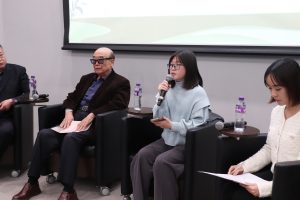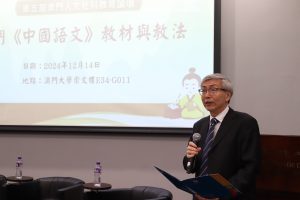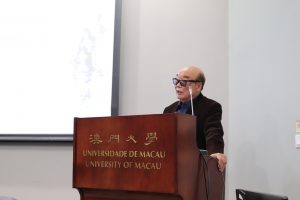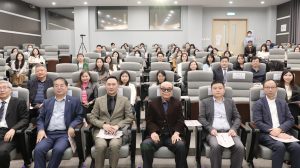The 5th Macao Forum on Humanities and Social Sciences Education was held at the University of Macau (UM) on 14 December 2024. The event brought together educators from across Macao to discuss ‘Teaching Materials and Methods of Chinese Language in Macao’, with the aim of promoting the quality of teaching materials and innovation of teaching methods of basic Chinese language education in Macao.
In his speech, Zhang Jian, associate dean of the UM Faculty of Arts and Humanities (FAH), said that language, as the core carrier of a nation’s culture, plays an irreplaceable role in cultivating the cultural and national identity among Macao students. He highlighted the remarkable achievements in Chinese language education in Macao, with the compilation of teaching materials becoming more systematic and diverse, and the incorporation of local characteristics and contemporary elements into teaching materials. Teaching methods have also shifted from traditional lectures to diverse approaches such as contextual, exploratory, and collaborative learning, which have stimulated students’ enthusiasm for learning. He expressed hope that the forum would gather wisdom from all sides in the face of new challenges and opportunities, and pave new paths for basic Chinese language education.
The forum was attended by representatives from academia, departments of education, and schools. Among them, Lei Kun Teng, emeritus professor at UM FAH, gave a keynote speech titled ‘Implementing the New Curriculum Standards and Utilising the New Teaching Materials Effectively’. He mentioned that the Education and Youth Development Bureau of the Macao SAR Government and Guangdong Education Publishing House jointly introduced new teaching materials for Chinese language education in Macao’s primary and secondary schools in 2021, and the Ministry of Education issued new curriculum standards in 2022, adding that the integration and implementation of these efforts have become the focus of education reform. Lei also discussed the distinctive feature of the Chinese language curriculum—the unification of its instrumental and humanistic qualities—and delved into the origins of the ‘humanities’. He suggested that teachers should draw the essence of the humanistic spirit from the traditional cultural concepts of ‘astronomy’ and ‘humanities,’ which emphasise comprehensive care for individuals, and thus integrate it into the Chinese language curriculum, so as to lay a solid foundation for the holistic development of students. He added that ‘core literacy’, which encompasses four dimensions including cultural confidence, language proficiency, thinking skills and aesthetic creativity, is central to the educational goals of the Chinese language curriculum.
In discussing the highlights of the new teaching materials, Lei pointed out two key transformations. The first is the transition from single-article teaching to unit-based teaching, which connects core concepts while balancing the characteristics and relevance of each article, thereby deepening knowledge integration and improving students’ reading and writing skills. The second is the transition from lecture-based teaching to reading-based teaching, which emphasises that reading ability is the foundation of self-learning and is crucial for comprehensive subject learning and the enhancement of overall literacy. In response to the upgraded reading requirements of the new teaching materials, Lei suggested that teachers should focus on awakening students’ subject consciousness, and help them break free from passive reading and interact actively with texts. Teachers should fully respect students’ reading autonomy, and adjust their teaching plan according to individual needs. They should also assume multiple roles, such as decorating the classroom as an organiser, guiding and motivating students as a facilitator, and engaging in the reading process as a participant, thus incorporating elements that stimulate new ideas and avoid the pitfalls of rote learning. Meanwhile, teachers should cultivate students’ reading ability from a multidimensional approach, balance the acquisition of knowledge and skills, and adopt a practice-oriented approach in the process of enhancing students’ language proficiency.
The discussion session was moderated by Sio Chio Ieong, assistant professor in UM FAH. Leaders, heads of Chinese language panel, and Chinese teachers from local schools such as the Affiliated School of the University of Macau, Pui Ching Middle School, Hou Kong Middle School, and Lou Hau High School shared their insights on the use of teaching materials, teaching methods, challenges, and experiences of innovative teaching. Lei spoke highly of the discussions.
In his concluding remarks, Sio highlighted three key points for raising the standard of basic Chinese language education in Macao: First, the government should be the main coordinator, leading key teachers to participate in research on teaching materials and teaching methods, and conducting systematic teacher training. Second, schools should take responsibility for designing the curriculum and coordinating teaching progress across different grades and units. Third, teachers should strive to continuously improve their Chinese language literacy. Fan Lianghuo, dean of the UM Faculty of Education, also highly praised the discussion outcomes and encouraged the participants to apply what they had learned from the forum in their schools, and integrate them into their daily teaching, so as to continuously inject vitality into Macao’s Chinese language education and propel the humanities and social sciences education in Macao to new heights.
| Source: Faculty of Arts and Humanities | |
| Media Contact Information: | |
| Communications Office, University of Macau | |
| Albee Lei | Tel: (853) 8822 8004 |
| Jason Leong | Tel: (853) 8822 8322 |
| Email: | prs.media@um.edu.mo |




